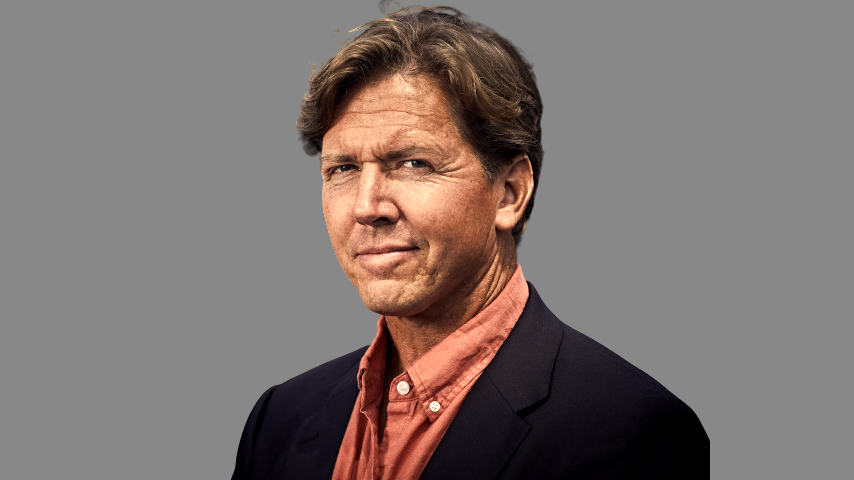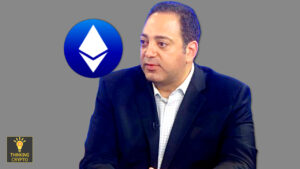Greg Beard, the CEO of Stronghold Digital Mining (Nasdaq listed: SDIG), talks about Stronghold’s unique approach to Bitcoin Mining, recent debt restructuring, mining in the US, Whitehouse crypto mining report, crypto regulations, and much more.
Transcript
Welcome back to the “Thinking Crypto” podcast, your home for cryptocurrency news and interviews. With me today is Greg Beard, who’s the CEO and Co-Chair of Stronghold Digital Mining. Greg, it’s great to have you on the show.
- Pleasure to be here. Thank you.
- Greg, I’m excited to learn about the mining operations that you and the folks at Stronghold have going. I’m a big Bitcoin holder. I’m excited that Bitcoin mining is happening in the United States versus China. And obviously, China, they did their ban and the miners went to different parts of the world, and many to the United States. But before we get there, where are you from? Where’d you grow up?
- I am from the Midwest. So I grew up in Peoria, Illinois, which is about three hours south of Chicago by car, a middle-sized Midwestern town. It’s a great place to be from, good place to be from. But I’ve been in New York City since 1993, and so I must like it here at this point. So, I think at this point I’m probably a New Yorker. I would say that the thing that made me sort of happy here was the pandemic. I think I was mostly unhappy with the things New Yorkers would be unhappy about, like traffic or trash on the streets or bad policy. But now it’s like, “Okay, hey, those are my homeless,” or, “Those are my terrible politicians.” Like now, I own it. So finally, that’s what the pandemic gave me is the ability to be a happy New Yorker for once.
- Yeah, well you and I both have an affinity for New York. We were talking before the recording. Despite all the challenges, I still miss it, even though I’m in the ‘burbs. It’s the greatest city in the world. You can’t beat it.
- I agree.
- So, tell us about what you did before working at Stronghold Digital Mining.
- Yeah, so I am now a public market CEO, but I spent 25 years in the energy private equity business. So, I started at Goldman Sachs in the Energy Group in 1993. That was my first job post-college. And went from there to private equity, investing in energy. So I spent 10 years at Riverstone, which is Carlyle’s energy arm. And then I built the energy team and ran the energy practice at Apollo for 10 years. So, I was ready to not do anything post-Apollo, but this opportunity was so compelling, I decided to pursue it.
- And what was your first encounter with Bitcoin or any other crypto, and what was your aha moment like? “Wait, this is something.”
- Yeah, so I really came at this from the power side, from the energy side. And so my involvement started when my partner Bill Spence called. He found me like in my kitchen in New York City trying to figure out how to bake croissants, which is a pretty tough trick if you ever try it. It’s easier to buy them actually. I’ve learned that firsthand. He owned Scrubgrass, which is one of our two power plants, and asked me to look at it with him to figure out, help him figure out, “Hey, can this be run more efficiently? “Can we make this plant make more money?” I agreed. I’m close friends with Bill and I’ve known him for a long time. So, it’s fun to work with him. And so in looking at it, we really discovered, hey, we were getting phone calls from all of these crazy Bitcoin miners that wanted to set up shop at our power plant. And the question was, “Well, should we sell power to them? “Should we modify our infrastructure “to bring the voltage down “to make the power usable for Bitcoin miners? “Or should we just mine it ourselves?” And so the decision to become a Bitcoin miner was an economic one. It was like, as you would expect, we studied hard on what are the economics of hosting versus the economics of mining yourself? And at the time, power prices were about $30 a megawatt hour when we got into this. And power prices are much, much higher now, about three times that actually. But the idea was, well, to sell power into the grid as a power plant, we can make $30 a megawatt, or we could host someone and make maybe 40 or $50 a megawatt hour, or mine ourselves and make probably around $60 a megawatt hour, or even 70 or 80. And so the economics of mining really dictated that we spend the capital ourselves, which is what we did. So that the logic of mining yourself versus being a hoster is really, hey, Bitcoin economics don’t work. Your hosting contracts aren’t worth anything ’cause your hosting guy is gonna quit paying you. And if the economics work, then you’re better off just doing it yourself. And the cost on the infrastructure is the same. So, really my view of hosting is the downside to hosting is the same as the downside for mining, but the upside from mining is exponentially higher than hosting. So, that was the logic behind becoming a miner ourselves. But I would say it was a journey. First figuring out. It’s a massive project and coming at it from the power side, it’s different than almost everyone else at the time. Everyone else at the time, three years ago were not very integrated. They were buying power from one party, buying hosting services from another party. And I think that that model, while it’s the most popular model, I think it shows the most vulnerability, because you don’t have an option. If Bitcoin economics don’t work, your revenue goes to zero. Whereas it being vertically integrated, which means we own our own power assets, we own our own data centers, we have the option like to mine Bitcoin or sell power, or actually we could even buy power from the grid if it’s cheap. So if Bitcoin economics are terrible, and they’re pretty bad right now. And so we spend a lot of our effort making power. Instead of converting it to Bitcoin, we sell that power to the grid and make more money selling power than we would mining Bitcoin during the day today. If things reverse and the power markets collapse, fantastic. We’ll shut the power plants down and we’ll pull that cheap power from the grid and convert it to Bitcoin. So, it’s a different model. Whereas others just have a one-way option. It’s like, hey, Bitcoin economics work. They mine for Bitcoin. And if they don’t, they don’t. It’s sort of like a single on-off switch. Ours is a multiple-factor equation on selling power or mining for Bitcoin or buying power and mining for Bitcoin, which I view as much more valuable. I was hoping it would be a few years before the advantages became apparent, but they’re apparent now. I think we’re seeing the stress in the system. We had the big bankruptcy announced this morning with Compute North, a huge hoster. That will ripple through the market. And I think that’s the amount of stress in this sector. Hey, it’s apparent. So, having the ability to toggle between power and mining, huge advantage. I think it’s the difference between surviving and not surviving. So, that’s sort of a long answer to the question, like what are we doing, how did this happen? To me, this is really a power arbitrage business, and that’s how you maximize margin. And if you’re not doing that, expect to have stress that you might not be able to survive. And so, hey, because I’m long-term bullish on Bitcoin, getting to survive to see the benefits of that, that’s the key. So, that’s how our business model is set up.
- So to confirm, you have the ability to mine, you have the ability to sell power. And so if at one point, like to your point, the economics of Bitcoin mining, it’s not great right now, the price is down, whatever it may be, you can pause that and sell the power and still maintain your revenues and operations and so forth?
- That’s exactly right. So, it’s an option. And by the way, we can exercise that option for an hour during the day or for all day. It doesn’t need to be a permanent state of the market. We developed software that allows us to toggle between mining and power almost instantly, which actually has the benefit of making the grid much more stable. So, that’s the one thing people don’t really talk about that much in terms of the way we’ve modified the grid. Who doesn’t want a cleaner, greener environment? Everyone does. But the cost of having that, of installing solar and wind, which are intermittent sources of power, as a result of installing all of that type of supply, we’re making the grid much less stable. And so what we do is we return that stability to the grid by allowing us to toggle between delivering power and mining Bitcoin. So, when grid pricing is up because there’s a constraint somewhere in the system, we’re more than likely going to be powering down our data center and delivering that power to the grid. And that helps for grid stability. So, I think there is a strong argument to say that, “Hey, Bitcoin can be part of a green solution “that we all look for.” In fact, we’re already doing that at Stronghold today.
- So, tell us about where your locations are, what regions you service, and whether it be selling the energy or mining. Can you tell us about that?
- Yeah, sure. So we have two power plants, both in Pennsylvania. One’s an hour and a half north of Pittsburgh, and the other is in Pennsylvania, about two and a half hours from New York City from here. So what makes us unique is that our plants are designed to reclaim waste coal. Our source of power has the word coal in it, which is a bad word today, clearly. But our plants are designed to clean up the coal waste left behind after more than a hundred years of mining in the state. So, people would have no reason to know this. Pennsylvanians know it because they live with it. But when you mine for coal originally, what you mined, probably 80 to 90% of it was used to make power or steel. The side of the coal seams or the parts of the coal that was brought up that was lower BTU were not suitable to be burned in a thermal coal-fired plant or in the process for making steel. That product, that coal was left on the side of the mine. So, it wasn’t disposed of properly. It was brought up from beneath the surface, from beneath the water table and left on the surface. And that was legal to do until the mid-’70’s. The problem is that there are now more than 800 of these giant piles. And I say the word pile. Like being a Midwesterner here, it’s like a pile of leaves. That’s not it. These are mountains. So, we need to rethink about how we categorize these waste sites. But we’re cleaning up hundreds of acres and there are billions of tons of this stuff. And the reason why you can’t leave it on the surface like that is that when it rains, all of these sulfur in these piles travels right through them, the rain travels through them, and you end up with the equivalent of sulfuric acid or battery acid that makes it into the water table, makes it into the rivers and lakes, and it makes land uninhabitable. So, it’s really a very nasty problem to have. And you can’t cover it with a tarp and pretend it’s not there. You can’t toss some grass seed on it. Yeah, grass seed will make it look better, but grass seed roots go down about a foot and a half and we’re cleaning up piles that are 200-feet deep. So, it doesn’t fix the problem, but it masks the problem. But it doesn’t fix it. The piles also catch on fire when they get hit by lightning or they smolder. So, of the 800 piles, about 80 of them are on fire. So anyway, this is a problem that Pennsylvanians live with. And they’ll drive past one of these piles on the way to work, on the way to school. They’re not only an eyesore, but they’re dangerous for the environment, dangerous for the water. They emit toxins. If you live near one, you’ll have a higher incidence of cancer than if you don’t. It is a problem that the state has recognized needs to be cleaned up. The only way to clean it up is to scoop it up with excavators and front-end loaders, take it by trucks to a facility like ours, and we incinerate it with emissions controls. So, we take out 99% of the toxins that will absolutely end up in the atmosphere if you don’t clean it in this way. And so the byproduct of all this reclamation is power and beneficial use ash that can be used in concrete or for like roadways, or just be backfilled to the sites where the coal waste came from. So, our source of power is unique, and I think from our vantage point it’s better than green because we’re actually cleaning up a problem instead of not contributing to one.
- Sure. And yeah, to your point, you’re fixing a problem. You’re able to monetize it as well, obviously through energy and Bitcoin mining. And I noticed that other energy companies are looking to do similar things with the excess energy blow off. Instead of it going to waste, utilizing it and monetizing it. So to your point, and I think the narrative or the story doesn’t get told about this for Bitcoin mining ’cause it’s always, “Okay, they’re using too much energy. “It’s bad for the environment.” But they’re not going into the creative and unique things that folks like yourself are doing that are mutually beneficial, like cleaning up things, making the grid more sustainable and things like that.
- Yeah no, we got like the data request from Elizabeth Warren. And hey, I would be happy to be invited to tell her in person. We’re cleaning up a nasty problem. All of the carbon that we emit as a part of our process will be emitted anyway because these piles burn on their own. And when they go through our process, you end up with clean water, rehabilitated communities, and you end up removing the toxins as a part of our process that will choke us all to death if it’s not done this way. But I get the sense they don’t want to hear it. I think they are looking for airtime and sort of the next industry to regulate. But hey, the reality is we’re making the grid more stable and cleaning the environment, and Pennsylvanians know it and support what we’re doing.
- Now, are there plans to move to or set up shop in other states that have maybe similar issues?
- You know what? So, the waste coal is this prevalent only in the areas that mined for coal, and Pennsylvania’s ground zero for this problem. West Virginia has a little bit of it. Certainly some other states also had coal mining, like Illinois had some as well. But I think our next stop might be another plant in Pennsylvania. And then we’re looking at sites, like our favorite types of sites are areas where you can buy power assets for not that much money because power in that jurisdiction is cheap. And so there are a few areas that fit that bill that we’re looking now. But yeah, I would absolutely expect us to grow either in a continuation of the types of activities we’ve been doing, or in a renewable energy jurisdiction. I think what we’re not gonna do, you’re not gonna see us acquire a thermal coal plant that is sort of the opposite of what we are are trying to achieve. We’ll stay green.
- So, tell us about your Bitcoin mining operations, like how many units you have, how big is it, how much hash power, maybe how much Bitcoin you guys are mining per day, or maybe how much you have on your balance sheet, things like that.
- Yeah, so we have two plants and two data centers, and each data center can house about 20,000 miners each. And when they’re all plugged in, we can achieve around 4X hash. That’s our capacity today. Right now, we’re producing about 1.3x hash. And we did an interesting swap where about a month ago gave most of our miners back to our lenders, and extinguished our debt in the process of doing that. And I think that slowed our x hash growth rate down for the third quarter. But that will resume sort of starting now and through the fourth quarter. So, we’re gonna get right back to where we were. My experience in private equity really led us to structure our debt agreement like an equipment loan. That gave us that flexibility to do that, which I think is unique. I think most guys that have loans from the bank will either go into bankruptcy like we see Compute North doing today, or they’re gonna have to restructure with their banks, where they’re really gonna have their equity values eliminated if we stay in a crypto winter like we’re in now. So, like I’m proud to say, “Hey, we made the right decisions “and we borrowed in the first place.” All of that debt elimination accrues straight to the equity. But in terms of how should the public think about us, I think about us getting to 4X hash, but just in a super capital-efficient way that’s accretive to us. I think lots of miners in this business think that the market wants them to produce 10 Bitcoin a day, 15 Bitcoin a day. From my vantage point, what the market ought to want is how much can you bring to the bottom line per day. ‘Cause if you can produce 15 Bitcoin a day, but it costs you the equivalent of 20 Bitcoin a day, well you would’ve been better off just buying the Bitcoin. I think ultimately the market will look through the economics of these businesses and recognize that, “Hey, mining is a competitive business. “It’s a capital-intensive business. “And it’s tough.” Which is why I think it’s important to own your own power, own your own infrastructure, because that’s gonna allow you to have higher margins. And so instead of saying, “Hey, we made 15 Bitcoin today,” you say, “We made 15 Bitcoin and we made it at a massive discount “to what you could have bought it for.” That’s a much more interesting story. But that’s really, I think there has been such a probably overexuberance in the marketplace where investors just wanted scale and size and weren’t all that concerned about profitability or about leverage, or about the structure of the leverage. And I think that those chickens are arriving back at home now. So, hey, I’m confident that we, hey, we’re gonna survive because of our model. We’re gonna survive the crypto winter, even if it’s protracted and lasts a long time. We’re set up to survive and that’s going to let us then be in a position of strength maybe to acquire others and continue to grow in a profitable way when others don’t have the model to do that.
- Yeah, I mean, mining smarter versus harder. And I think you guys have the setup to do that. So I’m curious, and you could take us behind the curtain, the Bitcoin that you mined, are you holding it? Are you selling some of it? Are you selling to institutions? Tell us about that.
- Yeah, so we generally, because we’re still growing, if we could hold it. At this price, you’d probably hold it rather than sell it, right? So, right now what we do is we mine it and we hold it. And when we see a day when you see the price up a little bit, we probably then sell it. Because we we have bills to pay in fiat or U.S. dollars that we need to pay. So at some point, hey, we’ll cross that threshold where we will have revenue that exceeds what our cash payables are. We will then have the option to hold. But at this point, we can’t. We have too many bills to pay to hold too much of it. So, we kind of aggregate a few million dollars worth and then sell today. But yeah, I think we wouldn’t be doing this if we were sort of bearish on Bitcoin long term. But I think given what’s happening in the public equities markets and the impact that we see in the Bitcoin market, it does make sense to be super careful and prudent with how you manage your cash.
- Yeah, for sure. I think I read and I heard different people say, “This is the first time Bitcoin maybe going through “these type of macroeconomic factors.” Where it was born out of the 2008, around 2008, but that was after the fact. But actually going through it and it is different times for sure. So, definitely have to be cautious.
- Oh, I think people’s faith will be tested for sure, if it’s not already. And I think that’ll ultimately be good for the market. It’s sort of healthy in every market for that to happen. I think we’re seeing discipline out of the Federal Reserve to try to control inflation. That’s sort of bad news for Bitcoin. Bitcoin bulls are gonna say, “Hey, the government has no discipline. “They’re just gonna print their way into oblivion.” Yeah, the government still will, but it’s just not overnight. So, with that sort of tightening, we’re seeing the impact on the tech markets and Bitcoin is not immune to that. If your tech portfolio is down 50%, you’re probably not feeling flush enough to go out and invest in Bitcoin today. So, I think it’s tough to expect Bitcoin to recover until the broader market recovers. And I think it’s clearly trending the other direction today.
- It’s also, funny enough, it’s playing out the four-year cycles. Like we had a run up yesterday. Yesterday? Last year, and hit new all-time highs. And we know that halving has been kind of that catalyst where it starts the new bull run or bull market. So, it’s kind of like we’re in 2018 right now, right, our version of 2018, and we’ll have to wait maybe a couple years. But we’ll certainly have rallies along the way, but that’s how I kind of look at it. It playing out this four-year cycle anyway.
- It seems like, hey, we don’t have 20 of these cycles, but we have a few, right? So, you can look at. And I agree with your conclusion. At the halving, the rewards for mining become less and then I think that’ll further stress the system. Yeah, I guess my advice for my brethren in this space that are mining is to get the balance sheets under control as quickly as possible, ’cause after 2024, if you’re not set up to succeed by then, you’ll have a different owner more than likely.
- So, do you guys offer services to retail in any way, or is it just mainly institutions? Maybe it’s if they wanna mine, buy capacity or energy, do you know anything about retail?
- No, we don’t. I’m interested in that. Obviously, hey, these are all digital assets, and so in theory you should be able to have thousands of retail kind of clients. But we haven’t done it yet. I think right now, I view this as a big industrial machine, and we’re just mining for ourselves. We’re a public company. And so the only way retail can get exposure to us is just by buying our stock. But I would be interested and we have looked at the idea of selling machines, buying machines wholesale, selling them retail, and then doing a retail hosting contract. But there’s only so many hours in the day. And so we’re focused mostly just on the industrial data center at this point.
- So you covered a lot, but is there anything that we can expect for the remainder of 2022 and anything in 2023 that you can give a hint on?
- You know what? I think we’ve done so much in the past month to restructure our balance sheet. Like the message to the public is, “Hey, we’re the same machine as we were before, “just with a much healthier balance sheet, “and all that value goes to the equity.” So, I think that’s one message. And then I think expect us to keep innovating. Like the capital structure that allowed us to restructure with the banks. We’re a creative bunch and like not to put others down, but hey, if you’re just buying power in a PPA from someone, having someone else host it, I’m not really sure what value you’re bringing. But I can tell you like, owning your own power assets, it’s painful. It’s a lot of hard work to run power plants, particularly this type of reclamation work. It’s a lot of work. It’s a lot of work to build and manage data centers, which we’re doing. But we’re doing it with the idea being that we can have higher margins and that should give us the ability to survive when others can’t. So yeah, I would say I expect a lot of really good announcements and news sort of between now and the end of the year that hopefully will give people confidence that the model that we set up is better and more durable. And I think there are plenty of Bitcoin bulls still remaining. And I would say, hey, and I encourage people to do the work to study us and compare us to the others, to others that are mining. And they will understand that, hey, if Bitcoin runs like we expect it to, ultimately, that our upside is the same or better than other people, and if Bitcoin stays in a crypto winter for an extended period, that we will survive and others won’t. I think that time will show that. But my hope is that we’ll begin to demonstrate that in the next couple quarters.
- I wanna talk about crypto mining and Bitcoin mining specifically in the United States, and a recent White House report. It’s not law, it’s not a bill or anything, but you mentioned Elizabeth Warren and there’s this whole ESG narrative and there’s a lot going on here and a lot to uncover. But I’m pleasantly surprised by the United States still allowing miners such as yourself to do business, create jobs, fix a lot of problems and stability on grids, what you guys are doing with using the coal and so forth and cleaning that up. There’s still a boom happening and I don’t know where things go. Maybe it’s just a lot of optics or grandstanding by some of these political people. Are you at all concerned about heavy regulations or potentially a ban in the future from the United States?
- You know what I would say? You always have to be aware and you want to make sure the market, the market and the public and politicians know that hey, the reality that we’re one company actually cleaning the environment, not polluting it. We’re one company that’s making the grid more stable, not less stable. We’re one company fixing the issues created by renewable energy. And so that’s truth. You wanna make sure that word gets out. Hey, but the mouthpiece of the executive branch, those are big mouth pieces, right? So, you can’t stay silent and just hope things work out by themselves. But I’m still confident that in this country, government usually doesn’t dictate what the best use of power is. There’s all sorts of uses of power that you could argue isn’t beneficial for society. And like I would argue, having a decentralized, secure, blockchain-driven currency, Bitcoin, is good for society and is good for the world, and it can help keep government in check. I’m not sure the U.S. government is afraid of Bitcoin or banks are afraid. I think, hey, it’s innovative and we should embrace it, not be afraid of it, which is mostly what we’re doing. I think you have some that if you’re leading a big bank, we have some leaders saying, “Hey, this is a big Ponzi scheme.” It’s like, well, I think we know what happens to the U.S. dollar over time. You can look backward. “The Bitcoin Standard” book sitting on my shelf over here explains like the history of currencies. Populist governments will 100% of the time wreck their currencies. And that’s why Bitcoin was created in the first place. We’re seeing that in slow motion with the dollar. And the dollar’s probably one of the stronger, right? So, you could argue Bitcoin maybe a better currency to be used by countries that don’t have a stable currency. How are people without safety nets, or healthcare or retirement systems, how are they going to save if their currency’s gonna be inflated down to nothing? So, I think that’s probably an attractive, I think for some folks even more than in the United States. But my hope is that you have, it’s populist grandstanding by politicians and executives that have a conflict of interest in what they’re saying. But I think at the end of the day, the U.S. should not, has not regulated how power is being used, and is unlikely to. It’s a bad precedent to set.
- Yeah, and also I think, despite what Jamie Dimon has to say. I tweeted about it yesterday. JP Morgan has launched a Bitcoin fund for their wealthy clients. And it was through NYDIG, I believe. So, the smoke and mirrors from Jamie Dimon as usual. But you also have these bigger institutions like BlackRock, who they just launched a Bitcoin spot trust, and Fidelity’s involved. And they said they’ve been mining for a while. These Bitcoin financial products are being built. And I feel like there’s a global competition as well because Putin is saying, “Oh, you know, Russia has an advantage “when it comes to Bitcoin mining.” In China, they banned it. So, I feel like the United States, it would not be smart for them to push Bitcoin mining out of the U.S., given that this is a new asset class, new tech. I think they would want to control it or have as much of it here, given that these large institutions are building products around it. It would just make sense.
- You’re right. I think if you looked at, every year, the amount of institutional acceptance and understanding is increasing. And like not withstanding this crypto winter that hopefully we’re in the middle of it, not the beginning. We’re seeing more interest, as you’re pointing out. I have CNBC on in the background over here, and it’s part of our daily narratives now. So in that sense, it’s a success. I view Bitcoin probably more as a store of value than as a great transactional security. But at some point, we’ll have the Buy It Now in Bitcoin button on Amazon or eBay, whichever your commerce platform is. And I think that’ll be sort of a victory for the platform.
- Yeah, I feel like it’s coming. PayPal’s already integrated it. And I was actually interviewing yesterday the founder of Paxos. They essentially power PayPal’s ability for people to use crypto, Bitcoin, of course, to buy, sell, and also to merchant services. So, it’s just a matter of time. It’s all gonna be part of the infrastructure. So I wanna get your thoughts also on the larger aspect of crypto regulations because we have, again, just a lot happening. The Biden executive order, the White House reports, then you have the SEC still walking on approving a Bitcoin spot ETF, and then CFTC wants more control. And then you have the Senator Lummis-Gillibrand bill. There’s a lot going on. How do you feel about all this? Are we moving in the right direction at least?
- You know what I would say? And this might not be popular among my colleagues that are leading crypto-focused businesses, but to be fair, if you are behaving like a bank and are arguing that you’re not a bank because you’re in crypto, you’re gonna end up being regulated like a bank. So, if you’re gonna have essentially depositors and let those depositors earn an interest rate, and then you’re making loans. So, if you’re acting like a bank and you’re retail-facing, banks are heavily regulated and they’re heavily regulated to protect the public. And so I think if your argument was, “Well hey, I’m not a bank. “Yes, I have all of these kinda retail clients “and I am accepting deposits, “but because it’s in crypto, “I’m arguing that I’m not a bank.” Yeah, the government’s gonna shut that loophole. And I think we’ve seen a couple of big failures now that would argue that, “Hey, maybe the government was even late “in regulating these guys.” If you’re making representations about the safety of investments and representing yourself to be bank-like, bank-like is a moniker that you earn with a lot of regulation. And that means when the banks go out and extend loans to help make interest payments to depositors possible, they’re not doing that in a risky way. And clearly with some of the bankruptcies that we’ve seen, that discipline wasn’t being upheld and the depositors lost money. And I would say, hey, if anything, the government was late. I guess my feeling is if you’re behaving like a bank, we have banking regulations to protect the public. And if you’re doing bank-like things, expect to be regulated along that same set of rules. In this instance, I don’t think it’s just sort of squawking from the regular-way banks that are worried about being displaced. I think, unfortunately, has already played out to the detriment of those retail investors that thought they had a safety that maybe wasn’t there.
- Yeah, and it’s a balance, right? It’s like protecting consumers, make surety, but don’t stifle innovation. And I think the United States got it right with the internet. And I think to your point that Celsius and these other folks, Voyager, should have been monitored closely, and there’s no FDIC there. So yeah, the retail got screwed. So, it’s putting these protections in and figuring out the balance and make sure the innovations still flourish.
- You know, there’s a balance. Hey, if there are any politicians that end up watching this podcast, I would say, hey, just be clear and move quickly. But like uncertainty stifles innovation and stifles capital investment. The story isn’t just Bitcoin. Like blockchain will end up impacting every segment of the economy. Like I kind of view it as bringing derivative-style transactions to a broader marketplace while having security, without having trusted intermediaries. It has the potential to be another like efficiency gain like what the internet brought us or what home computers brought us 30 years ago. So, I think, hey politicians, there is potential for another efficiency gain for the economy. Don’t stifle the innovation. Be quick with your regulation and just regulate the aspect of it that can impact consumers. But let the institutions evaluate risks and take it. But I think we’re mostly, early Bitcoin miners probably have a little bit of a twinge of anti-government, anti-regulation. And hey, I feel it. Like who likes to be regulated? “I’m gonna do my thing. “Leave me alone.” That works, and I believe in that as well, as long as you’re sort of not doing harm to regular, ordinary people. And I think we’re gonna see more acceptance and adoption if there’s light regulation that is unchanging and known and it lets people participate in this part of the economy without as much risk.
- Yeah, absolutely. Got some wrap-up questions here for you. First is rapid fire. Favorite food?
- Geez, probably chocolate mousse. If I had to only eat one thing, yeah probably something sweet like that.
- Favorite musician or band?
- It depends. Probably it’s not creative enough, but like U2. I think they’re an amazing band. Been around too long, probably shows my age at this point, but that’s probably it.
- Favorite movie?
- Aw, man. Probably my favorite screenplay right now would be like “The Departed” is an amazing screenplay. But you can’t just have one. I do love movies, but just off-cuff, that’s a good one to watch.
- Favorite book?
- Oh, “Atlas Shrugged.” That’s probably the classic and probably good for, talking about government or anti-government. That’s the danger of too much would be that book.
- What do you do for a hobby when you’re not working at Stronghold?
- I have three kids. I’m a pilot and I fly my own plane around, so that’s sort of between golf, flying, kids, there isn’t a whole lot of spare time. But I’m mostly working on making Stronghold a success. That’s my immediate-term goal.
- And finally, if you could create your own metaverse, what would the theme be? Where would you go to if you put on your Oculus? What would be Greg’s domain?
- You know, that’s a great question. I like it right here in my reality. Life is good. I like where I am, so it wouldn’t look too different than what I’m currently experiencing actually.
- Greg, pleasure chatting with you. I’m excited to see the new updates and announcements around Stronghold later this year and into next year. Thank you so much for joining me today.
- Hey, my pleasure, anytime.







